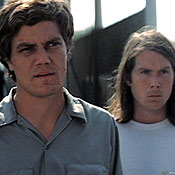- REVIEW
- READER REVIEWS
Shotgun Stories
|
|
Genre
Drama, Suspense/Thriller
Producer
David Gordon Green
Distributor
International Film Circuit
Release Date
Apr 18, 2008
Release Notes
NY
Official Website
Review
As a male movie critic with both liberal-humanist convictions and a hypersensitivity to injustices large and small, I seesaw between contradictory impulses: to denounce screen fantasies of vigilante vengeance as antithetical to social harmony, and to get royally pissed off when bad guys don’t die with enough gurgling and hemorrhaging. My inner divide is one of the reasons I was so moved by Jeff Nichols’s Shotgun Stories, a mournful drama in which two sets of brothers—they share a father—engage in a deadly feud. The movie makes you empathize with the rage that drives these young men to violence—but it also makes you see how manly action wipes out their individuality, their uniqueness, and turns them into archetypal meatheads.
I don’t use “archetypal” lightly. Shotgun Stories has mythic undertones (and overtones, and mid-tones). I hesitate to mention that the protagonist (Michael Shannon) is known as “Son” and his brothers are “Boy” (Douglas Ligon) and “Kid” (Barlow Jacobs) for fear you’ll think that Nichols has saddled them with too much allegorical baggage. Don’t hate him because he’s pretentious—so are lots of earnest young directors! The story is set in southeast Arkansas, against a landscape of isolated farms and dilapidated main streets, and the rhythms are languid; but the lines that pop out of these stuporous characters’ mouths have the bitter tang of real life. Here are the Hayes brothers as they swill beer on a rundown corner: “This is one empty-ass town.” (Pause.) “If I owned this town, I’d sell it.” (Pause.) “We don’t own the square root of shit.”
They don’t really own their family name, either, since their wastrel father ran out on them, turned over a new (religious) leaf, and started over again with another wife and kids. Not long into Shotgun Stories, the boys’ estranged mother shows up and curtly informs them their father has died. The next day, they crash the funeral in jeans and T-shirts. Son makes a speech in which he castigates his father for leaving them to be “raised by a hateful woman,” then spits on the grave. A primal injury has been answered—with a primal insult. One of the second set of Hayes brothers (Travis Smith) won’t let that insult go, and pretty soon you start to get an uneasy feeling about the welfare of Boy’s dog. You can see the horror that’s coming, but it comes slowly, dragging its dead-dog carcass, which gives you plenty of time to dread the tit-for-tat payback that grows in intensity like a drug addiction.
Nichols is a graduate of the North Carolina School of the Arts, also home to the film’s co-producer, David Gordon Green (director of George Washington and the recent Snow Angels), and Shotgun Stories is broadly in the category of what we sniggering urbanites used to call “deadbeat regionalism” (before the indie movement was kicked into the mainstream by Quentin Tarantino and Harvey Weinstein). But the sensibility here is more subversive, more attuned to the South’s subliminal violence. Adam Stone’s wide-screen cinematography captures the heat and the corrosive moisture, the lush green of the cotton fields and the rust of the pickup trucks, the natural beauty juxtaposed with the unnatural human debris. The place is breathtaking—and utterly indifferent to the people who inhabit it. The landscape reinforces the pathos of the first set of Hayes brothers, whose mother raised them to hate the second set and then left them to make their own way. Now the likably ingenuous Kid is camped in a tent on Son’s lawn, while slobbola Boy lives out of his old van, which doesn’t work so well after he plugged an air-conditioner he found on the street into his cigarette lighter. The boys are easy prey for “Shampoo” (G. Alan Wilkins), a drug dealer on the run from cops after blowing up his lab: Every time this cyclops (he has a cloth over a damaged eye) shows up he casually incites them to violence. The drug he’s pushing is revenge.
Shotgun Stories has a flawless cast, but it’s the peculiarity of Michael Shannon that keeps it from becoming too obvious. Maybe you saw him as the delusional, paranoiac Iraq vet in the underrated Bug, or the thuggish, blackmailing brother-in-law in Before the Devil Knows You’re Dead, or the spookily pious ground-zero hero of World Trade Center—or as a solemn, six-foot-three-and-a-half-inch figure staring into a script on your F train. The huge, square forehead would make him a natural for Frankenstein’s monster, and I don’t mean that as an insult. His deliberateness can be lovable, even romantic, but can also signal desperation, as if his head were too cavernous for him to snatch and string together all his thoughts. He’s a fascinating actor—the perfect hero for movies suffused with rage against the Creator.
